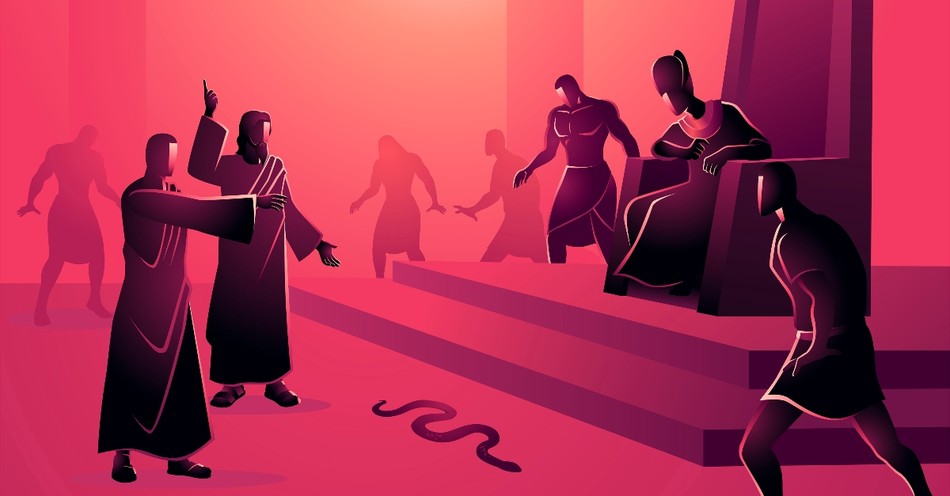Aaron’s Highlights
Claim to fame: Aaron served as the first high priest.
Worst betrayal: Crafting a golden calf.
Bible Verses about Aaron
If you’re going to read only one Bible chapter about Aaron, take four minutes and read Exodus 32:1-35. Or take three minutes and read the main part of the story, Exodus 32:1-24.
Most of Aaron’s story is told in the second, third, and fourth books in the Bible.
Exodus. In Exodus 1-12, Aaron is called to join Moses in confronting Egypt and leading the Exodus. In chapters 16-19, there are significant ups and downs after the Exodus.
Aaron is assigned as high priest in chapter 24. He is given instructions for serving in the tabernacle in Exodus 27-31.
Of course, the infamous Golden Calf rebellion against the Lord happens in Exodus 32. Then more instructions are given in chapters 34-35 and in chapters 38-40.
Leviticus. Aaron is mentioned in Leviticus 1-3,6-7. His ordination occurs in chapters 8-9. The death of his two oldest sons, Nadab and Abihu is recorded in Leviticus 10.
In Leviticus 16, he is given instructions for entering the Most Holy Place. He is also mentioned in Leviticus 21-22,24.
Numbers. In Numbers, Aaron is mentioned in chapters 1-4, 7-9. In Numbers 12, he and his sister, Miriam, oppose Moses. He is, again, mentioned in Numbers 14.
The budding of his staff occurs in Numbers 16-18. God’s judgment against him and Moses is given in chapter 20. His genealogy is documented in chapter 26, and, finally, his death on Mount Hor at the age of 123 is recorded in Numbers 33.
Aaron’s Family Tree
His father was Amram, his mother was Jochebed. His younger siblings were, of course, Miriam and Moses. He married Elisheba. They had four sons: Nadab, Abihu, Eleazar, and Ithamar, and an acclaimed grandson, Phinehas. His descendants have been aptly coined the Aaronites.
Aaron’s First 83 Years
We know when Aaron was born. We know who his parents were. We know who he married and how many sons he had. That said, Aaron’s life story really doesn’t start in earnest until he’s 83 years old.
Aaron’s Final 40 Years
For four decades, Aaron served alongside his much more famous younger brother, Moses. Their sister Miriam was in the mix as well. Together, they were the real-life superheroes of the 15th century BC.
While Moses remains in the spotlight all 40 years, Aaron often shared that spotlight early on, especially when it came to confronting Egypt’s powerful Pharaoh. From an earthly perspective, Aaron was at the zenith of his power.
After the Exodus, the Israelites camped at Mount Sinai while Moses went atop to meet with the Lord God, creator of heaven and earth. The Lord gave the Ten Commandments and many, many other commands to Moses. The process took several weeks.
While Moses was on Mount Sinai, the people grew more and more restless. Finally, they demanded that Aaron lead them back to Egypt. In an effort to appease them and stay put, Aaron crafted a Golden Calf.
In his mind, it may have simply represented where the Lord God sat, but that idea quickly flew out the window. Instead, the people worshiped the Golden Calf itself. It was their new idol, their new god. How fickle, foolish, and rebellious!
When Moses returned, he rebuked Aaron in no uncertain terms. “What did these people do to you, that you led them into such great sin?” (Exodus 32:21).
Aaron’s Life Story in the Bible
Peer pressure. Do we ever really outgrow it? Aaron certainly experienced great pressure to appease the people.
It probably wasn’t that Aaron lost his faith in the Lord God. In the past, he had seen God’s miracles and great glory. In the future, God would set him and his family apart as high priests — the only Israelites allowed in the Holy of Holies (Leviticus 8:1-2).
So, what went wrong with Aaron?
Left in charge of the Israelites for 40 days, Aaron couldn’t hold to what he knew was true against what the people desired and demanded. The Israelites wanted a god they could see, not a God who was cloaked in dark clouds and lightning (Exodus 19:16-18).
They wanted a religion of wild parties, not a situation where they must wait to hear from God. And who knew what happened to that Moses guy, anyway?
Their needs weren’t being met and they demanded a change (Acts 7:39-41). Giving their gold to Aaron, they begged him for a god they could see to worship. Out of the fire came a calf — a poor imitation of the Lord God, creator of heaven and earth (Exodus 32:22-24).
Aaron didn’t lose the priesthood for his part in the Israelite’s idolatry, but he did lose an opportunity to lead the people closer to their one true God.
Lessons from Aaron's Life
Many people today clamor for a god they can fashion after their own image and a religion they can that meets what they think their real needs.
When they can’t see or understand God’s mysterious ways, they redefine him to fit their own understanding. As a result, they create futile idols of the imagination.
You and I can sympathize with others as they wrestle with the unexplained parts of life and God’s mysterious ways. But, unlike Aaron, we cannot give in to the pressure to remake God just to make them feel better.
Instead, let’s hold forth God’s Word and wait for Him to reveal Himself and His ways in His own time.
That’s Not Where His Story Ends
However, that’s not the last that we read about Aaron.
- Aaron’s name appears 45 more times in the rest of the Old Testament (1 Chronicles; 2 Chronicles; Psalms).
- His name also appears five times in the New Testament (Luke 1:5; Acts 7:40; Hebrews 5:4; Hebrews 7:11; Hebrews 9:4).
For further reading:
What Is Idolatry in the Bible? Its Definition and Significance
Why Did God Have to Give His People the 10 Commandments?
What Does it Mean That God Is Just?
Photo Credit: ©iStock/Getty Images Plus/rudall30




